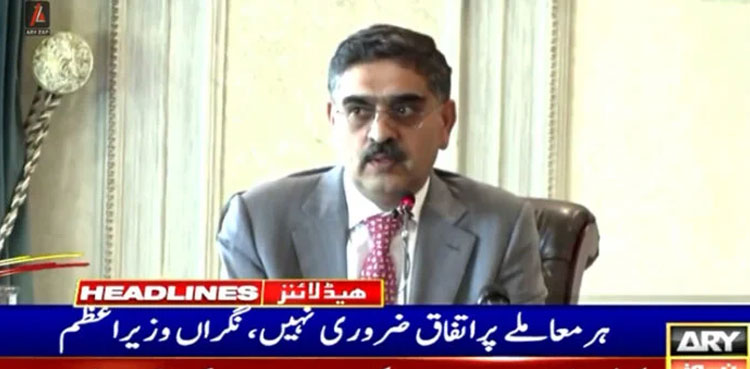Pakistan's recent financial aid and investment partnerships, including with the IMF, Saudi Arabia, UAE, and China, provide temporary relief from economic challenges, but the country must address issues such as low growth, high inflation, unemployment, and limited foreign exchange reserves through deregulation, investment in education and technology, tax reform, privatization, and political stability to achieve lasting prosperity.
Pakistan is governed by a complex web of influential entities, including the military establishment, IMF and bilateral donors, powerful business elites, the religious right, and the people, making it difficult for meaningful relief and democratic transition to occur.
Pakistan's Chief of Army Staff, General Asim Munir, outlines key economic policies and assures a stable business environment during a meeting with top businessmen in Karachi, reflecting similarities with former military dictator Zia-ul-Haq's approach.
Pakistan's civilian and military leaderships are optimistic that Gulf states, particularly Saudi Arabia, will invest billions of dollars in the country to alleviate its cost-of-living crisis, but doubts remain about the feasibility of these projections and the need for economic reforms and stability.
Pakistan's ongoing economic woes, including budget deficits, trade deficits, and foreign exchange shortages, are not solely caused by corruption but rather a lack of will from leaders to implement necessary solutions and prioritize economic growth, such as increased productivity, better-managed state finances, and global competitiveness, while shedding unproductive state-owned enterprises. The country must also embrace economic pragmatism by opening trade with all countries, investing in human capital, and avoiding ideological distractions to achieve economic modernization.
Prime Minister Anwaarul Haq Kakar met with a delegation from the Islamabad Chamber of Commerce and Industry, discussing efforts to achieve economic stability through tax reform, combating electricity theft, and cracking down on smuggling.
Pakistan needs to address concerns related to incentives, coordination, and remittance in order to secure Saudi investments in copper, mineral, refinery, and solar projects worth $25-30 billion, including the construction of a $10-12 billion refinery in Hub or Gwadar.
Despite Pakistan's immense potential in various sectors such as energy and agriculture, the country continues to face economic injustice and elite capture, which undermines social justice and human development, according to economist Dr Hafiz Pasha; in recent months, however, the government has taken action against electricity theft, currency smuggling, and commodity hoarding to combat these issues.
Pakistan's Caretaker Prime Minister Anwaarul Haq Kakar addressed the United Nations General Assembly, emphasizing the need to counter all forms of terrorism, including Hindutva extremists, and calling for opposition against the root causes of terrorism such as poverty and injustice.
